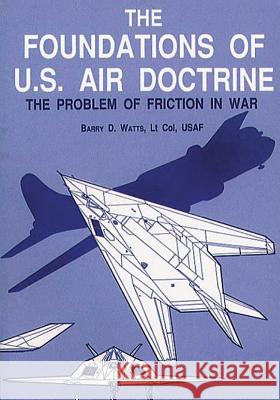The Foundations of U.S. Air Doctrine - The Problem of Friction in War » książka
The Foundations of U.S. Air Doctrine - The Problem of Friction in War
ISBN-13: 9781478352372 / Angielski / Miękka / 2012 / 186 str.
FROM THE AUTHOR: This study revolves around friction, meaning the ubiquitous uncertainties and inescapable difficulties that form the atmosphere of real war. More specifically, it attempts to utilize the Clausewitzian concept of general friction as a basis for assessing-and, if necessary, reshaping-the foundations of US air doctrine. This critical application of friction gives rise to four primary conclusions: (1) The key assumptions underlying mainstream US doctrine for conventional air warfare have not evolved appreciably since Air Corps Tactical School (ACTS) theorists elaborated their theory of precision, industrial bombardment during the 1930s. (2) Judged by their essential premises and logic, post-Hiroshima theories of deterrence are little more than an updating for the nuclear age of ACTS bombardment doctrine. (3) Both ACTS bombardment doctrine and deterrence theory appear fundamentally flawed insofar as they omit the frictional considerations that distinguish real war from war on paper. (4) Reflection upon the extent to which friction pervades the elemental processes of actual combat suggests that the range of situations in which greater numbers or superior weapons guarantee victory is relatively limited; even in the age of thermonuclear weapons, the outcomes of battles still turn, more often than not, on the character and intelligence of a few brave individuals. The first step in giving substance to these claims is to explain what the central beliefs of US airmen traditionally have been. The reader should be warned, however, that I have approached the writings on war of airmen like Major General Haywood S. Hansell, Jr., and nuclear strategists like Bernard Brodie-as well as those of Carl von Clausewitz himself-from the perspective of two interrelated questions. What overriding assumptions about war did these individuals embrace? And what image of war as a total phenomenon is bound up in their assumptions? In large part, answering these questions is a matter of historical inquiry and, to be candid, I have been far less concerned with writing history for its own sake than with using the past to illuminate the problems of the present. I, therefore, leave it to the reader to judge whether I have managed to do so without injuring the historical record. Air University Press.
Zawartość książki może nie spełniać oczekiwań – reklamacje nie obejmują treści, która mogła nie być redakcyjnie ani merytorycznie opracowana.











